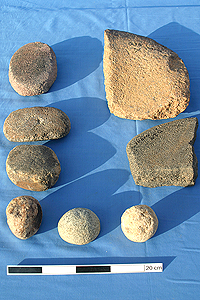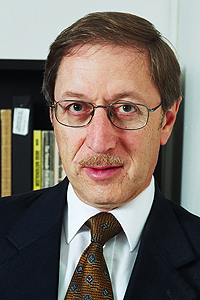Chicago In The News
The Chronicle’s biweekly column Chicago In the News offers a digest of commentary and quotations by a few of the University faculty members, students and alumni who have been headlining the news in recent weeks. Chicago faculty members are some of the most frequently quoted experts, so space allows publishing references to only selected examples. To read many of the full newspaper articles mentioned in this column, visit the In the News column at the University News Office Web site: http://www-news.uchicago.edu/
Shift in eminent domain cases
Richard Epstein, the James Parker Hall Distinguished Service Professor in the Law School, was quoted in a New York Times article that reported on an eminent domain case in the state of New Jersey. In such cases, municipalities seek to take over land that they have designated as an area of blight and use it for economic development. In the New Jersey case, a state Supreme Court ruling decided that the municipality of Paulsboro had overstepped its authority by establishing a plot of private property as a redevelopment area. Epstein, the article noted, said the decision could be seen in the context of a recent judicial pushback against broad definitions of blight. In past cases, Epstein noted, “If you could define by fiat an area as blighted or seedy, the battle was over.” Now, he said, “There is going to be more rooted opposition the more people feel threatened.” The article was published Thursday, June 14.
The good and bad news
Deborah Burnet, Associate Professor in Medicine and Pediatrics, was quoted in a front-page story published in the Tuesday, June 19 Chicago Tribune, which reported on a study that found an existing gender gap in medical progress being made for people with diabetes. “There’s good news, here. We are making progress. The bad news is it appears to be limited to men,” said Burnet. According to a Center for Disease Control and Prevention study, which surveyed nearly 100,000 people, the rate of deaths from all causes increased 41 percent among women with diabetes. These findings have led health care experts to conclude that there is a significant gender gap in health care. The article also highlighted an outreach program at the University that targets young minority populations, who are at greater risk of diabetes.
Achievement gap narrows
A new study released by the Consortium on Chicago School Research, which shows that Chicago Public Schools students do not lag behind in academic achievement among their peers as they get older, was featured in stories reported by Crain’s Chicago Business, the Chicago Sun-Times, and on ABC 7 News in Chicago. The study, which compares CPS students’ test scores with those of students within the same racial/ethnic groups across the state, shows the achievement gap narrows steadily through eighth grade. “In the past, it had been common for observers to claim that the longer students were enrolled in CPS, the further behind they fell,” said John Easton, Executive Director of the consortium. “The evidence suggests to the contrary. On the whole, students in higher grades are less behind than students in lower grades,” he said in the ABC7 News report. The report was broadcast Thursday, June 21.
 Small grindstones and hammerstones from Hosh el-Guruf in Sudan. | |
Kush had wealth, influence
Geoff Emberling, Director of the Oriental Institute Museum, was interviewed for several articles that appeared in The New York Times, the Los Angeles Times, National Geographic and the Guardian, which reported on a expedition that he and Research Associate Bruce Williams made to Sudan to excavate the site of the ancient kingdom of Kush along the Nile river. Excavating at a site in Hosh el-Guruf, 225 miles north of Khartoum, the archaeologists uncovered grinding stones made of a granite-like rock called gneiss. The rock would have been used to crush ore to recover flakes of gold. The discovery of a center for organized gold production reveals that the people of Kush not only would have gained great wealth, but also political influence in Egypt to the north. “This makes Kush a more major player in political and military dynamics of the time than we knew before. Studying Kush helps scholars have a better idea of what statehood meant in an ancient context outside such established power centers of Egypt and Mesopotamia,” said Emberling in the Tuesday, June 19 New York Times article.
 Bernard Wasserstein | |
Need for bold leaders
Bernard Wasserstein, the Harriet & Ulrich E. Meyer Professor of Modern European Jewish History in History and the College, wrote a commentary on the long history of division between Israelis and Palestinians, as well as the divisions among the Jewish people of Israel and those between the Arab people of Gaza and the West Bank. Wasserstein noted in the article, published Sunday, June 17 in The Independent, that new, bold leadership on both Israeli and Palestinian sides is needed during the current state of affairs—with Fatah battling against Hamas, and Israelis suffering from “the split at the historic heart of Zionism.” Wasserstein proposes that Ehud Barack, once prime minister and now incoming defense minister, could be the leader Israel needs, comparing his political path to that of Yitzhak Rabin’s. On the Palestinian side, Wasserstein proposes Marwan Barghouti, a young Fatah leader imprisoned by the Israelis since 2002. “A Hebrew speaker, a secularist and a pragmatist, he might be an effective interlocutor with Barak,” wrote Wasserstein. “In spite of all the sound and fury of the new Islamic republic in Gaza and notwithstanding the provocative actions and words of the Israeli far right, both Israel and Palestine are today post-ideological societies, exhausted and disillusioned by profound historic failures, and in search of new leaders who can liberate them from past traumas and present miseries.”
![[Chronicle]](/images/sidebar_header_oct06.gif)